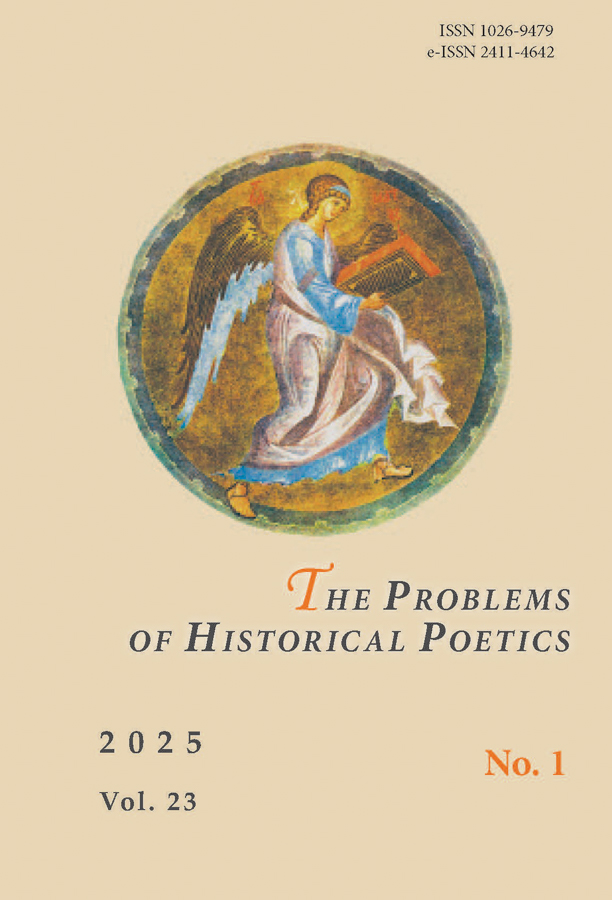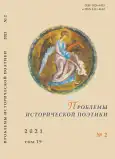Utopia as an anti-utopia (Andrey Platonov's short novel Bread and reading)
- Authors: Zavarkina M.V.1
-
Affiliations:
- Petrozavodsk State University
- Issue: Vol 19, No 2 (2021)
- Pages: 326-352
- Section: Articles
- URL: https://journal-vniispk.ru/1026-9479/article/view/284450
- DOI: https://doi.org/10.15393/j9.art.2021.9402
- ID: 284450
Cite item
Full Text
Abstract
The article analyzes A. Platonov's short novel Bread and Reading, which is the first part of an unfinished trilogy called Technical Novel. Different approaches to the analysis of the writer's anti-utopian strategy are considered, and certain terms related to the intra-genre typology of his works, which are still the subject of controversy in Platonov studies, i.e., utopia, anti-utopia, metautopia, dystopia, and cacotopia are clarified. The article offers a new
perspective on this problem and concludes that the short novel is characterized by a complex conflict between utopia and anti-utopia, namely, utopian consciousness is embodied in the form of anti-utopia, which leads to the ambivalence in meaning and the appearance of internal antinomies. This mainly revealed in the title of the short novel, the epigraph, a special type of plot situation and the character system structure. Platonov's work is characterized not only by the problem of the relationship between man and nature, but also that of between man and technology, which becomes a part of the anthropological worldview and acquires human features. Platonov's characters dream of a time when technology, nature and man are in a harmonious relationship, helping each other overcome universal entropy. The motif of construction sacrifice, traditional in the poetics of Platonov's works, plays an important role in the short novel: it is premature and shameful to think about personal happiness in the world of socialism that has not yet been built, without enough “bread and reading.” The work reflects Platonov's own hopes and doubts, and if the “principle of hope” (E. Bloch) is the main principle of utopian consciousness, then the writer's doubt becomes the main feature of his anti-utopia strategy. On the one hand, this makes it difficult to identify the genre of the short novel Bread and Reading (utopia or anti-utopia), on the other, it does not lead to an “imbalance” of forces, but, rather, to a meek awareness of the place of man in the world and his limited capabilities. An important role is also played by the fact that The Juvenile Sea was supposed to become the second part of the trilogy, and Dzhan may have made up the third
part: the three works not only complement, but also “explain” each other. In the finale of Bread and Reading, the characters remain focused on the “distant,” as they stay in the same utopian dream space. Likely never having found a way out of the “impasse of utopia,” Platonov leaves Technical Novel unfinished.
About the authors
M. V. Zavarkina
Petrozavodsk State University
Author for correspondence.
Email: mvnikulina@mail.ru
ORCID iD: 0000-0001-7972-2265
PhD (Philology), Specialist, Web-laboratory of Institute of Philology
Russian Federation, PetrozavodskReferences
- Antonova E. A. Platonov and the History of Electrification of the Voronezh Province 1923–1924. In: «Strana filosofov» Andreya Platonova: problemy tvorchestva [“Country of Philosophers” by Andrey Platonov: The Problems of Works]. Moscow, A. M. Gorky Institute of World Literature of the Russian Academy of Sciences Publ., Nasledie Publ., 2000, issue 4, pp. 760–768. (In Russ.)
- Barsht K. A. Poetika prozy Andreya Platonova [Poetics of Andrey Platonov’s Prose]. St. Petersburg, Philological faculty of St. Petersburg State University Publ., 2000. 320 p. (In Russ.)
- Blokh E. The Principle of Hope. In: Utopiya i utopicheskoe myshlenie [Utopia and Utopian Thinking]. Moscow, Progress Publ., 1991, pp. 49–78. (In Russ.)
- Budin P. A. Biblical, Mythological, Utopian: Analysis of Andrey Platonov’s Novella “Dzhan”. In: Tvorchestvo Andreya Platonova: issledovaniya i materialy [Works of Andrey Platonov: Research and Materials]. St. Petersburg, Nauka Publ., 2008, book 4, pp. 149–156. (In Russ.)
- Varlamov A. Andrey Platonov. Moscow, Molodaya gvardiya Publ., 2011. 546 p. (Ser. “The Life of Wonderful People”). (In Russ.)
- Vasil’ev V. Andrey Platonov. Ocherk zhizni i tvorchestva [Andrey Platonov. Essay on Life and Creative Work]. Moscow, Sovremennik Publ., 1982. 230 p. (In Russ.)
- Vetlovskaya V. E. “There Lived a Poor Knight in the World…”. In: F. Ya. Priyma i voprosy filologii XX veka: issledovaniya. Vospominaniya. Materialy [F. Ya. Priyma and Questions of Philology of the 20th Century: Researches. Memories. Materials]. St. Petersburg, 2009, pp. 33–65. (In Russ.)
- Geller L. Science and Myth, Grotesque and Poetry: Four Elements of “The Juvenile Sea”. In: Poetika Andreya Platonova. Sbornik 1: na puti k «Yuvenil’nomu moryu» [The Poetics of Andrey Platonov. Part 1: On the Way to “The Juvenile Sea”]. Belgrade, 2013, pp. 103–133. (In Russ.)
- Geller L. Over the Mountains of Labor. On the Approaches to the Quantitative Analysis of “Bread and Reading”. In: Poetika Andreya Platonova. Sbornik 2: novye territorii [The Poetics of Andrey Platonov. Part 2: New Territories]. Moscow, Sovpadenie Publ., 2015, pp. 110–132. (In Russ.)
- Geller L. Land Management of Andrey Platonov, or Spaces in “Bread and Reading”. In: Poetika Andreya Platonova. Sbornik 4: na samoy cherte gorizonta: platonovskie prostranstva [The Poetics of Andrey Platonov. Part 4: On the Very Edge of the Horizon: Platonic Spaces]. Moscow, Polimedia Publ., 2019, pp. 131–149. (In Russ.)
- Geller M. Ya. Andrey Platonov v poiskakh schast’ya [Andrey Platonov in Search of Happiness]. Moscow, MIK Publ., 2000. 432 p. (In Russ.)
- Gryaznova A. Yu. «Iskat’ dorogi drug k drugu»: sirotstvo i rodstvo v proze Andreya Platonova [“To Search for Ways to Each Other”: Orphanhood and Kinship in the Prose of Andrey Platonov]. Voronezh, NAUKA-UNIPRESS Publ., 2014. 193 p. (In Russ.)
- Gunther H. Po obe storony ot utopii: konteksty tvorchestva A. Platonova [On Both Sides of Utopia: Contexts of A. Platonov’s Works]. Moscow, Novoe literaturnoe obozrenie Publ., 2012. 216 p. (In Russ.)
- D’yakov D. A. The Philosophy of Technology in the Works of Andrey Platonov. In: Vestnik Udmurtskogo universiteta. Ser. Istoriya i filologiya [Bulletin of Udmurt University. Ser. History and Philology], 2014, issue 4, pp. 50–57. (In Russ.)
- Zavarkina M. V. The Genre Strategy in A. Platonov’s Short Novels of the 1930s. In: Problemy istoricheskoy poetiki [Problems of Historical Poetics]. Petrozavodsk, Petrozavodsk State University Publ., 2015, issue 13: Actual Aspects, pp. 554–569. Available at: https://poetica.pro/files/redaktor_pdf/1456407233.pdf (accessed on October 1, 2020). doi: 10.15393/j9. art. 2015.3402 (In Russ.) (a)
- Zavarkina M. V. A. Platonov's Story “Bread and Reading” in the Context of the Stories of the 1930s: to the Question of the Genre Strategy of the Writer. In: Zhanry v istoriko-literaturnom protsesse: sbornik nauchnykh statey [Genres in the Historical and Literary Process: Collection of Scientific Articles]. St. Petersburg, 2015, issue 6, pp. 65–76. (In Russ.) (b)
- Zavarkina M., Khramykh A. Socialist Utopia in the Works of A. P. Platonov. In: Novoe literaturnoe obozrenie [New Literary Observer], 2017, no. 147, pp. 200–213. (In Russ.)
- Zolotonosov M. Andrey Platonov: The Discoverer of Cacotopia. In: Vosstanie mass: sbornik [The Revolt of the Masses: Digest]. St. Petersburg, Midgard Publ., 2005, pp. 86–99. (In Russ.)
- Kazarkin A. P. “Technical Novel” by A. Platonov: Change of Chronotopes. In: Tekst. Kniga. Knigoizdanie [Text. Book. Publishing], 2014, no. 3 (7), pp. 107–122. (In Russ.)
- Kaminskiy K. Elektroroman Andreya Platonova. Opyt rekonstruktsii [Electroman by Andrey Platonov. Experience of Reconstruction]. Moscow, NLO Publ., 2020. 512 p. (In Russ.)
- Kolesnikova E. I. Platonov’s Small Prose. In: Tvorchestvo A. Platonova: issledovaniya i materialy [Works of A. Platonov: Research and Materials]. St. Petersburg, Nauka Publ., 2000, issue 2, pp. 254–318. (In Russ.)
- Kornienko N. V. Novel by Andrey Platonov as a Philosophical-Psychological Unity. In: Tselostnost’ khudozhestvennogo proizvedeniya: mezhvuzovskiy sbornik nauchnykh trudov [Integrity of the Artistic Work: Interuniversity Collection of Scientific Papers]. Leningrad, 1986, pp. 27–37. (In Russ.)
- Kornienko N. From the “Homeland of Electricity” to the “Technical Novel” and Back: Metamorphoses of Platonov’s Text in the 1930s. In: «Strana filosofov» Andreya Platonova: problemy tvorchestva [“Country of Philosophers” by Andrey Platonov: The Problems of Works]. Moscow, A. M. Gorky Institute of World Literature of the Russian Academy of Sciences Publ., Nasledie Publ., 2000, issue 4, pp. 739–744. (In Russ.)
- Lepakhin V. Icon in the Works of Platonov. In: Tvorchestvo A. Platonova: issledovaniya i materialy [Works of A. Platonov: Research and Materials]. St. Petersburg, Nauka Publ., 2004, issue 3, pp. 61–82. (In Russ.)
- Malygina N. Model of the Plot in the Prose of A. Platonov. In: «Strana filosofov» Andreya Platonova: problemy tvorchestva [“Country of Philosophers” by Andrey Platonov: The Problems of Works]. Moscow, Nasledie Publ., 1995, issue 2, pp. 274–286. (In Russ.)
- Malygina N., Matveeva I. Comments. In: Platonov A. P. Efirnyy trakt: Povesti 1920-kh — nachala 1930-kh godov [Platonov A. P. “Efirny Trakt”: Short Novels 1920s — the Beginning of the 1930s]. Moscow, Vremya Publ., 2011, pp. 513–558. (In Russ.)
- Meerson O. «Svobodnaya veshch’». Poetika neostraneniya u Andreya Platonova [“A Free Thing”. The Poetics of Non-Estrangement of Andrey Platonov]. Novosibirsk, Nauka Publ., 2001. 122 p. (In Russ.)
- Nayman E. “There is No Way out of the Truth”. A. Platonov Between Two Utopias. In: Novoe literaturnoe obozrenie [New Literary Observer], 1994, no. 9. pp. 233–250. (In Russ.)
- Tuzkov S. A. Russkaya povest’ nachala ХХ veka. Zhanrovo-tipologicheskiy aspekt [The Russian Short Novel of the Early of the 20th Century. Genre and Typological Aspect]. Moscow, FLINTA Publ., Nauka Publ., 2011. 304 p. (In Russ.)
- Fomichev S. A. Pushkin’s Ballad About the Poor Knight. In: Fomichev S. A. Pushkinskaya perspektiva [Fomichev S. A. Pushkin’s Perspective]. Moscow, Znak Publ., 2007, pp. 101–112. (In Russ.)
- Chalikova V. A. Metautopia of Andrey Platonov. In: Chalikova V. A. Utopiya rozhdaetsya iz utopii: esse raznykh let [Chalikova V. A. Utopia is Born from Utopia: Essays of Different Years]. London, Overseas Publ. Interchange Ltd Publ., 1992, pp. 162–177. (In Russ.)
- Chebarov I. “Literary” Machines of Andrey Platonov. In: Logos, 2010, no. 1 (74), pp. 90–111. (In Russ.)
- Chebarov I. Elements of Machine Synthesis in Platonov’s “Technical Novel”. In: Translit, 2012, no. 9. Available at: https://litbook.ru/article/268/ (accessed on October 1, 2020). (In Russ.)
- Shentalinskiy V. Raby svobody v literaturnykh arkhivakh KGB [Slaves of Freedom in the Literary Archives of the KGB]. Moscow, Parus Publ., 1995. 390 p. (In Russ.)
- Yablokov E. A. The Principle of Artistic Thinking of A. Platonov “and so, and back” in the Novel “Chevengur”. In: Filologicheskie zapiski [Philological Notes]. Voronezh, 1999, issue 13, pp. 14–27. (In Russ.)
Supplementary files











